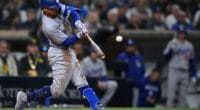On Monday night, Gavin Lux barreled a ball 103.4 mph with a launch angle of 28 degrees off Atlanta Braves starter Huascar Ynoa in the Los Angeles Dodgers’ 7-4 win, yet had nothing to show for it.
Balls hit like that post an expected batting average of .860, but for Lux, his ended up being a 390 feet flyout to center field.
While that would normally be attributed to the marine layer or just getting unlucky, it comes after MLB has been continuously changing their baseballs over the past few seasons and began to require humidors to be used in every ballpark.
With all the recent changes being made, Dodgers manager Dave Roberts is skeptical of the baseballs being used by MLB.
“I am. Velocity off the bat, trajectory, time of day,” Roberts said when asked if he was shocked after Lux’s ball didn’t go over the fence for a home run. “I’m not a conspiracy theorist, but it just seems like something’s different. But I don’t know. I was surprised.”
So far this season, only three teams have a slugging percentage of .430 better, compared to 16 teams that did that in 2019. One of them is the Colorado Rockies, who always have inflated offensive totals because of playing home games at Coors Field.
The Dodgers’ offense has been strong as expected, but they are only slugging .402 as a team, a significant drop compared to their .429, .483, .472, .442 and .437 slugging percentages over the previous five seasons.
Roberts still expects the home run totals to pick up for his club, but he is seeing a concerning trend.
“There’s been a handful that I felt off the bat, the sound, the trajectory, the velocity, that I thought would be home runs that didn’t go out of the ballpark,” he said.
The main thing affecting the drop in home run totals may be the humidor that MLB has required for all teams. Humidors work by bringing baseballs to an average humidity, which means in a dry park, baseballs will become more humid, and thus heavier.
In humid parks, however, a humidor will dry out the baseballs and make them lighter.
In general, baseballs travel further in humid air than they do in dry air, but in dry climates, baseballs have higher exit velocities but don’t travel as far.
Dodger Stadium is one of the least-humid stadiums on average, so they are already battling the effects of having baseballs that won’t travel as far. But now, if the humidors are making their baseballs more humid and heavier, then they are also going to facing the effects of lower exit velocities.
The combination of a baseball that won’t travel as far and can’t be hit as hard is a poor combination for home run production, and it seems that’s what’s happening to the Dodgers.
Roberts also worried about foreign substance checks
MLB began to enforce rules that banned the use of foreign substances on baseballs last June with the hope offense would increase with the elimination of a significant advantage pitchers had gained through increased spin rates.
It was a controversial decision due to the enforcement beginning midseason with pitchers saying it adds injury risk because of the need to grip and throw a baseball differently.
Nevertheless, MLB continued the increased enforcement despite their concerns and instructed umpires to randomly check pitchers’ hands after an inning. The immediate affect was lower spin rates across the league, but the numbers rose again near the season’s end.
MLB has now increased their efforts to enforce the rules this season, but Roberts is concerned the rules will be enforced somewhat arbitrarily because rosin that is provided by MLB becomes sticky when it mixes with sweat.
Have you subscribed to the Dodger Blue YouTube channel? Be sure to ring the notification bell to watch player interviews, participate in shows and giveaways, and stay up to date on all Dodgers news and rumors!




